Accounting Ethics Analysis: Chapters 4, 5, 6, 8 & 9 Report
VerifiedAdded on 2023/06/04
|9
|2071
|277
Report
AI Summary
This report analyzes several key chapters on accounting ethics, covering topics such as the characteristics of a profession, codes of conduct, and ethical considerations in managerial and tax accounting. The report begins by establishing accounting as a profession, outlining its key characteristics. It then delves into the AICPA's professional code of conduct, differentiating between principles and rules, and discussing their practical implications. Furthermore, it explores the ethics of managerial accounting, including codes of conduct, unethical behaviors, and the importance of whistleblowing policies. Finally, the report examines the ethics of tax accounting, emphasizing the responsibilities of tax professionals and taxpayers in upholding ethical standards and preventing tax evasion. The report highlights the significance of ethical behavior, professional integrity, and social responsibility within the accounting field.
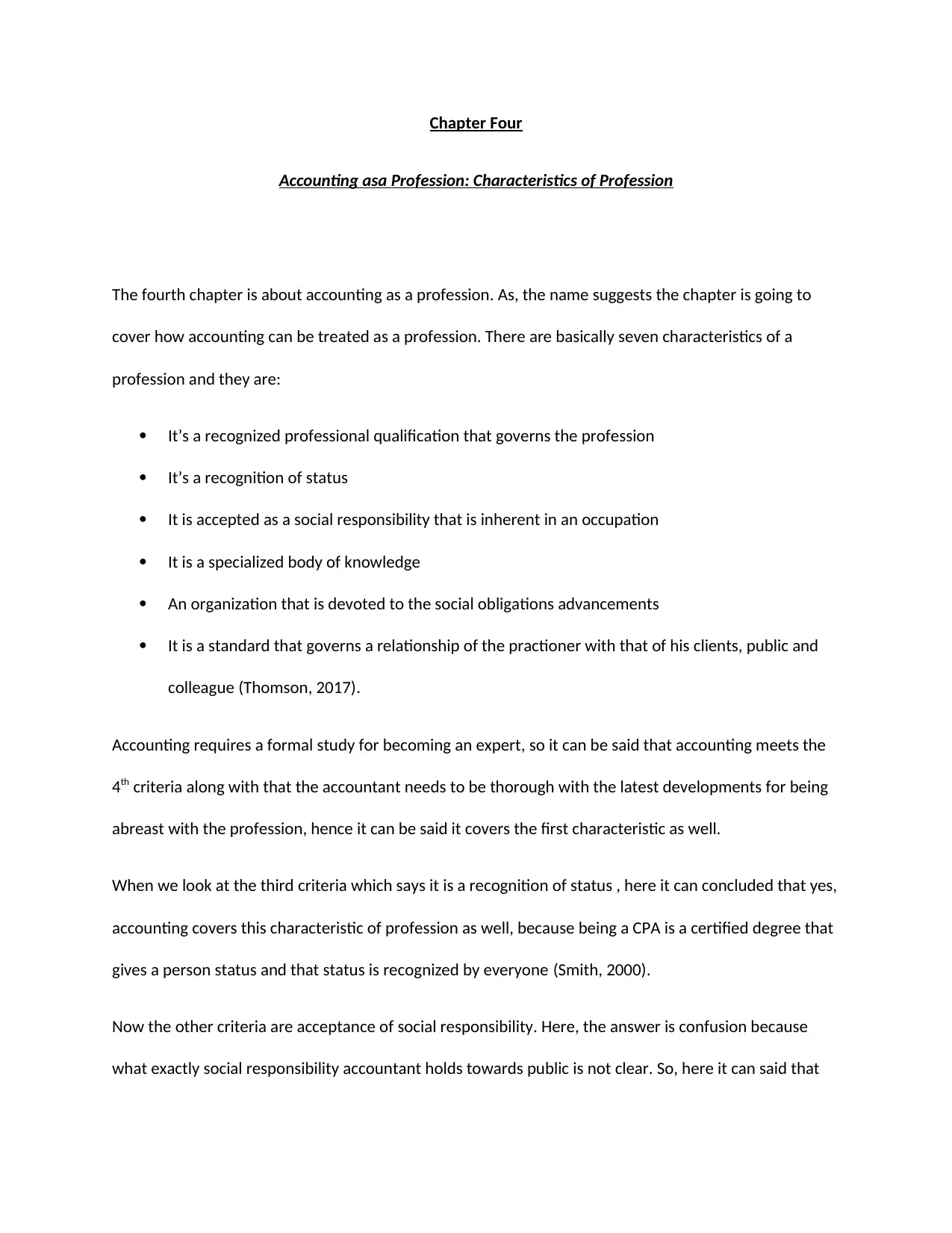
Chapter Four
Accounting asa Profession: Characteristics of Profession
The fourth chapter is about accounting as a profession. As, the name suggests the chapter is going to
cover how accounting can be treated as a profession. There are basically seven characteristics of a
profession and they are:
It’s a recognized professional qualification that governs the profession
It’s a recognition of status
It is accepted as a social responsibility that is inherent in an occupation
It is a specialized body of knowledge
An organization that is devoted to the social obligations advancements
It is a standard that governs a relationship of the practioner with that of his clients, public and
colleague (Thomson, 2017).
Accounting requires a formal study for becoming an expert, so it can be said that accounting meets the
4th criteria along with that the accountant needs to be thorough with the latest developments for being
abreast with the profession, hence it can be said it covers the first characteristic as well.
When we look at the third criteria which says it is a recognition of status , here it can concluded that yes,
accounting covers this characteristic of profession as well, because being a CPA is a certified degree that
gives a person status and that status is recognized by everyone (Smith, 2000).
Now the other criteria are acceptance of social responsibility. Here, the answer is confusion because
what exactly social responsibility accountant holds towards public is not clear. So, here it can said that
Accounting asa Profession: Characteristics of Profession
The fourth chapter is about accounting as a profession. As, the name suggests the chapter is going to
cover how accounting can be treated as a profession. There are basically seven characteristics of a
profession and they are:
It’s a recognized professional qualification that governs the profession
It’s a recognition of status
It is accepted as a social responsibility that is inherent in an occupation
It is a specialized body of knowledge
An organization that is devoted to the social obligations advancements
It is a standard that governs a relationship of the practioner with that of his clients, public and
colleague (Thomson, 2017).
Accounting requires a formal study for becoming an expert, so it can be said that accounting meets the
4th criteria along with that the accountant needs to be thorough with the latest developments for being
abreast with the profession, hence it can be said it covers the first characteristic as well.
When we look at the third criteria which says it is a recognition of status , here it can concluded that yes,
accounting covers this characteristic of profession as well, because being a CPA is a certified degree that
gives a person status and that status is recognized by everyone (Smith, 2000).
Now the other criteria are acceptance of social responsibility. Here, the answer is confusion because
what exactly social responsibility accountant holds towards public is not clear. So, here it can said that
Paraphrase This Document
Need a fresh take? Get an instant paraphrase of this document with our AI Paraphraser
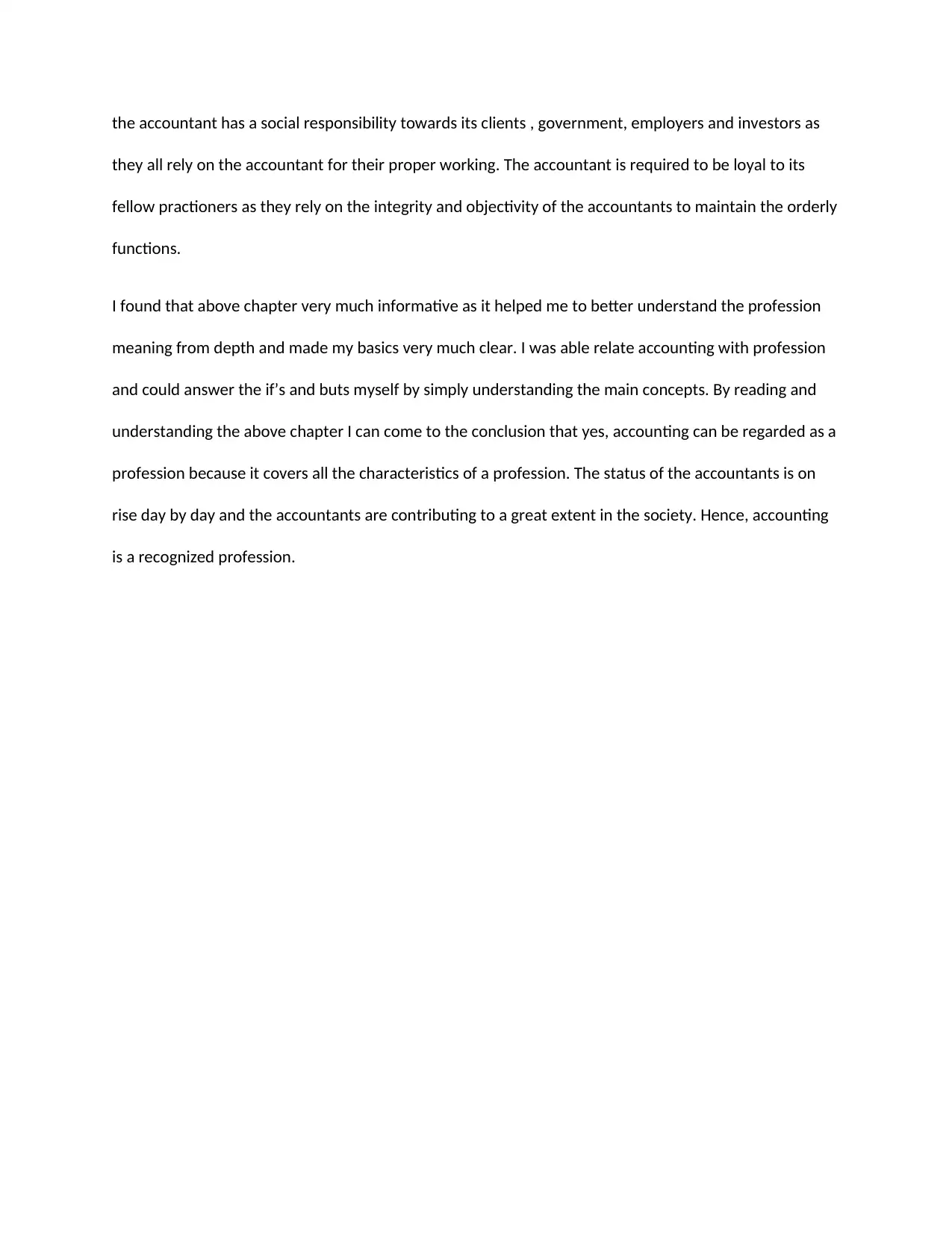
the accountant has a social responsibility towards its clients , government, employers and investors as
they all rely on the accountant for their proper working. The accountant is required to be loyal to its
fellow practioners as they rely on the integrity and objectivity of the accountants to maintain the orderly
functions.
I found that above chapter very much informative as it helped me to better understand the profession
meaning from depth and made my basics very much clear. I was able relate accounting with profession
and could answer the if’s and buts myself by simply understanding the main concepts. By reading and
understanding the above chapter I can come to the conclusion that yes, accounting can be regarded as a
profession because it covers all the characteristics of a profession. The status of the accountants is on
rise day by day and the accountants are contributing to a great extent in the society. Hence, accounting
is a recognized profession.
they all rely on the accountant for their proper working. The accountant is required to be loyal to its
fellow practioners as they rely on the integrity and objectivity of the accountants to maintain the orderly
functions.
I found that above chapter very much informative as it helped me to better understand the profession
meaning from depth and made my basics very much clear. I was able relate accounting with profession
and could answer the if’s and buts myself by simply understanding the main concepts. By reading and
understanding the above chapter I can come to the conclusion that yes, accounting can be regarded as a
profession because it covers all the characteristics of a profession. The status of the accountants is on
rise day by day and the accountants are contributing to a great extent in the society. Hence, accounting
is a recognized profession.
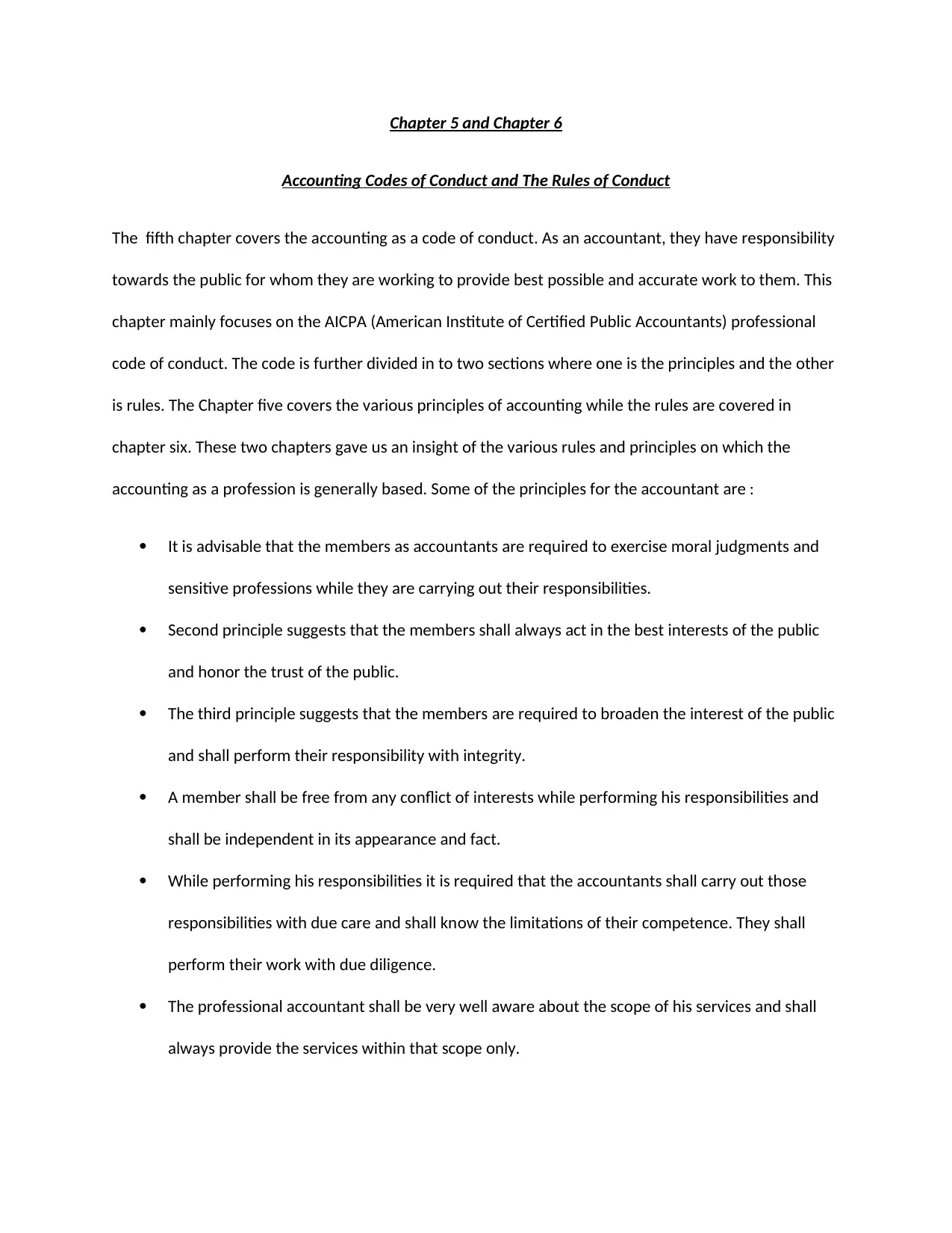
Chapter 5 and Chapter 6
Accounting Codes of Conduct and The Rules of Conduct
The fifth chapter covers the accounting as a code of conduct. As an accountant, they have responsibility
towards the public for whom they are working to provide best possible and accurate work to them. This
chapter mainly focuses on the AICPA (American Institute of Certified Public Accountants) professional
code of conduct. The code is further divided in to two sections where one is the principles and the other
is rules. The Chapter five covers the various principles of accounting while the rules are covered in
chapter six. These two chapters gave us an insight of the various rules and principles on which the
accounting as a profession is generally based. Some of the principles for the accountant are :
It is advisable that the members as accountants are required to exercise moral judgments and
sensitive professions while they are carrying out their responsibilities.
Second principle suggests that the members shall always act in the best interests of the public
and honor the trust of the public.
The third principle suggests that the members are required to broaden the interest of the public
and shall perform their responsibility with integrity.
A member shall be free from any conflict of interests while performing his responsibilities and
shall be independent in its appearance and fact.
While performing his responsibilities it is required that the accountants shall carry out those
responsibilities with due care and shall know the limitations of their competence. They shall
perform their work with due diligence.
The professional accountant shall be very well aware about the scope of his services and shall
always provide the services within that scope only.
Accounting Codes of Conduct and The Rules of Conduct
The fifth chapter covers the accounting as a code of conduct. As an accountant, they have responsibility
towards the public for whom they are working to provide best possible and accurate work to them. This
chapter mainly focuses on the AICPA (American Institute of Certified Public Accountants) professional
code of conduct. The code is further divided in to two sections where one is the principles and the other
is rules. The Chapter five covers the various principles of accounting while the rules are covered in
chapter six. These two chapters gave us an insight of the various rules and principles on which the
accounting as a profession is generally based. Some of the principles for the accountant are :
It is advisable that the members as accountants are required to exercise moral judgments and
sensitive professions while they are carrying out their responsibilities.
Second principle suggests that the members shall always act in the best interests of the public
and honor the trust of the public.
The third principle suggests that the members are required to broaden the interest of the public
and shall perform their responsibility with integrity.
A member shall be free from any conflict of interests while performing his responsibilities and
shall be independent in its appearance and fact.
While performing his responsibilities it is required that the accountants shall carry out those
responsibilities with due care and shall know the limitations of their competence. They shall
perform their work with due diligence.
The professional accountant shall be very well aware about the scope of his services and shall
always provide the services within that scope only.
⊘ This is a preview!⊘
Do you want full access?
Subscribe today to unlock all pages.

Trusted by 1+ million students worldwide
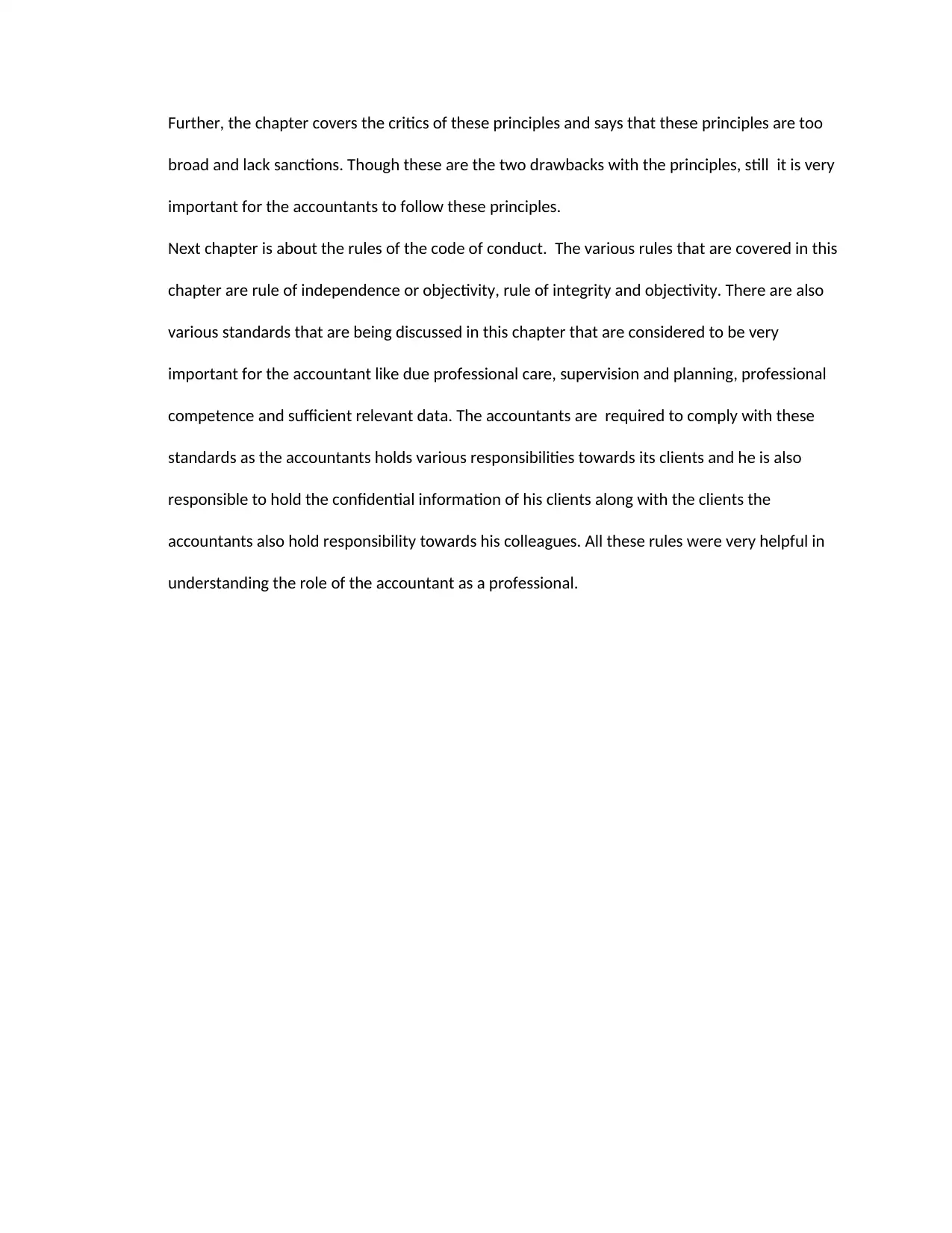
Further, the chapter covers the critics of these principles and says that these principles are too
broad and lack sanctions. Though these are the two drawbacks with the principles, still it is very
important for the accountants to follow these principles.
Next chapter is about the rules of the code of conduct. The various rules that are covered in this
chapter are rule of independence or objectivity, rule of integrity and objectivity. There are also
various standards that are being discussed in this chapter that are considered to be very
important for the accountant like due professional care, supervision and planning, professional
competence and sufficient relevant data. The accountants are required to comply with these
standards as the accountants holds various responsibilities towards its clients and he is also
responsible to hold the confidential information of his clients along with the clients the
accountants also hold responsibility towards his colleagues. All these rules were very helpful in
understanding the role of the accountant as a professional.
broad and lack sanctions. Though these are the two drawbacks with the principles, still it is very
important for the accountants to follow these principles.
Next chapter is about the rules of the code of conduct. The various rules that are covered in this
chapter are rule of independence or objectivity, rule of integrity and objectivity. There are also
various standards that are being discussed in this chapter that are considered to be very
important for the accountant like due professional care, supervision and planning, professional
competence and sufficient relevant data. The accountants are required to comply with these
standards as the accountants holds various responsibilities towards its clients and he is also
responsible to hold the confidential information of his clients along with the clients the
accountants also hold responsibility towards his colleagues. All these rules were very helpful in
understanding the role of the accountant as a professional.
Paraphrase This Document
Need a fresh take? Get an instant paraphrase of this document with our AI Paraphraser
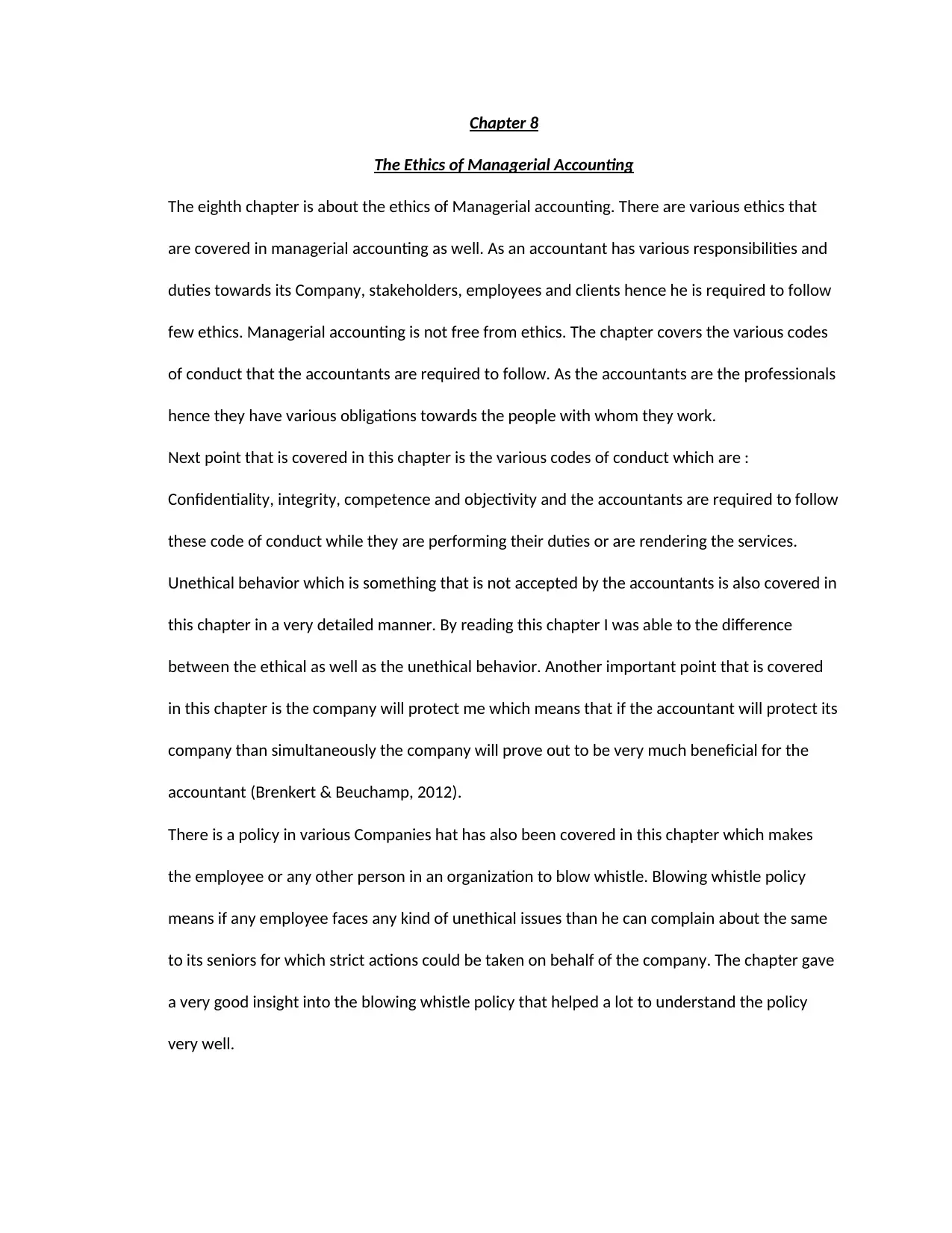
Chapter 8
The Ethics of Managerial Accounting
The eighth chapter is about the ethics of Managerial accounting. There are various ethics that
are covered in managerial accounting as well. As an accountant has various responsibilities and
duties towards its Company, stakeholders, employees and clients hence he is required to follow
few ethics. Managerial accounting is not free from ethics. The chapter covers the various codes
of conduct that the accountants are required to follow. As the accountants are the professionals
hence they have various obligations towards the people with whom they work.
Next point that is covered in this chapter is the various codes of conduct which are :
Confidentiality, integrity, competence and objectivity and the accountants are required to follow
these code of conduct while they are performing their duties or are rendering the services.
Unethical behavior which is something that is not accepted by the accountants is also covered in
this chapter in a very detailed manner. By reading this chapter I was able to the difference
between the ethical as well as the unethical behavior. Another important point that is covered
in this chapter is the company will protect me which means that if the accountant will protect its
company than simultaneously the company will prove out to be very much beneficial for the
accountant (Brenkert & Beuchamp, 2012).
There is a policy in various Companies hat has also been covered in this chapter which makes
the employee or any other person in an organization to blow whistle. Blowing whistle policy
means if any employee faces any kind of unethical issues than he can complain about the same
to its seniors for which strict actions could be taken on behalf of the company. The chapter gave
a very good insight into the blowing whistle policy that helped a lot to understand the policy
very well.
The Ethics of Managerial Accounting
The eighth chapter is about the ethics of Managerial accounting. There are various ethics that
are covered in managerial accounting as well. As an accountant has various responsibilities and
duties towards its Company, stakeholders, employees and clients hence he is required to follow
few ethics. Managerial accounting is not free from ethics. The chapter covers the various codes
of conduct that the accountants are required to follow. As the accountants are the professionals
hence they have various obligations towards the people with whom they work.
Next point that is covered in this chapter is the various codes of conduct which are :
Confidentiality, integrity, competence and objectivity and the accountants are required to follow
these code of conduct while they are performing their duties or are rendering the services.
Unethical behavior which is something that is not accepted by the accountants is also covered in
this chapter in a very detailed manner. By reading this chapter I was able to the difference
between the ethical as well as the unethical behavior. Another important point that is covered
in this chapter is the company will protect me which means that if the accountant will protect its
company than simultaneously the company will prove out to be very much beneficial for the
accountant (Brenkert & Beuchamp, 2012).
There is a policy in various Companies hat has also been covered in this chapter which makes
the employee or any other person in an organization to blow whistle. Blowing whistle policy
means if any employee faces any kind of unethical issues than he can complain about the same
to its seniors for which strict actions could be taken on behalf of the company. The chapter gave
a very good insight into the blowing whistle policy that helped a lot to understand the policy
very well.
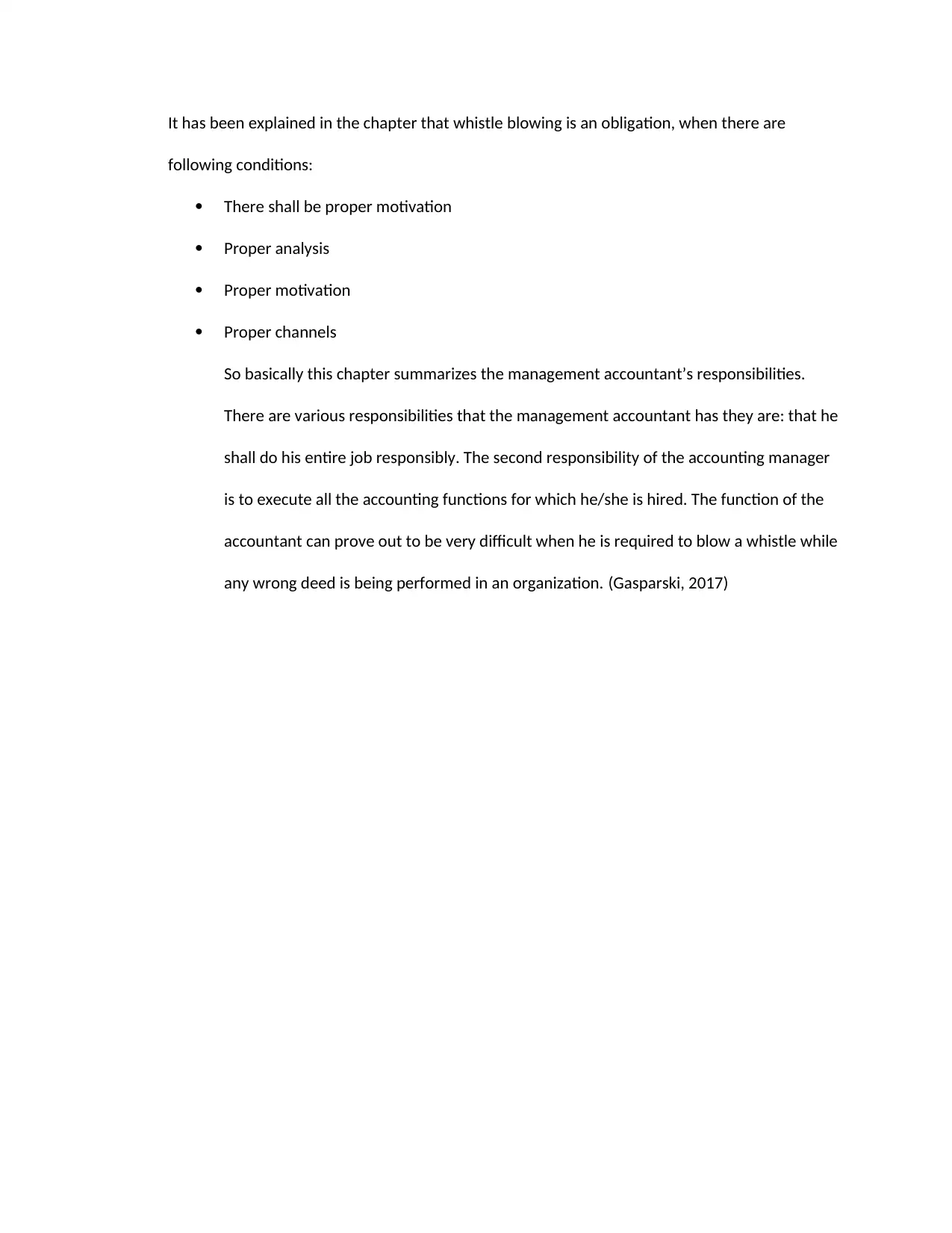
It has been explained in the chapter that whistle blowing is an obligation, when there are
following conditions:
There shall be proper motivation
Proper analysis
Proper motivation
Proper channels
So basically this chapter summarizes the management accountant’s responsibilities.
There are various responsibilities that the management accountant has they are: that he
shall do his entire job responsibly. The second responsibility of the accounting manager
is to execute all the accounting functions for which he/she is hired. The function of the
accountant can prove out to be very difficult when he is required to blow a whistle while
any wrong deed is being performed in an organization. (Gasparski, 2017)
following conditions:
There shall be proper motivation
Proper analysis
Proper motivation
Proper channels
So basically this chapter summarizes the management accountant’s responsibilities.
There are various responsibilities that the management accountant has they are: that he
shall do his entire job responsibly. The second responsibility of the accounting manager
is to execute all the accounting functions for which he/she is hired. The function of the
accountant can prove out to be very difficult when he is required to blow a whistle while
any wrong deed is being performed in an organization. (Gasparski, 2017)
⊘ This is a preview!⊘
Do you want full access?
Subscribe today to unlock all pages.

Trusted by 1+ million students worldwide
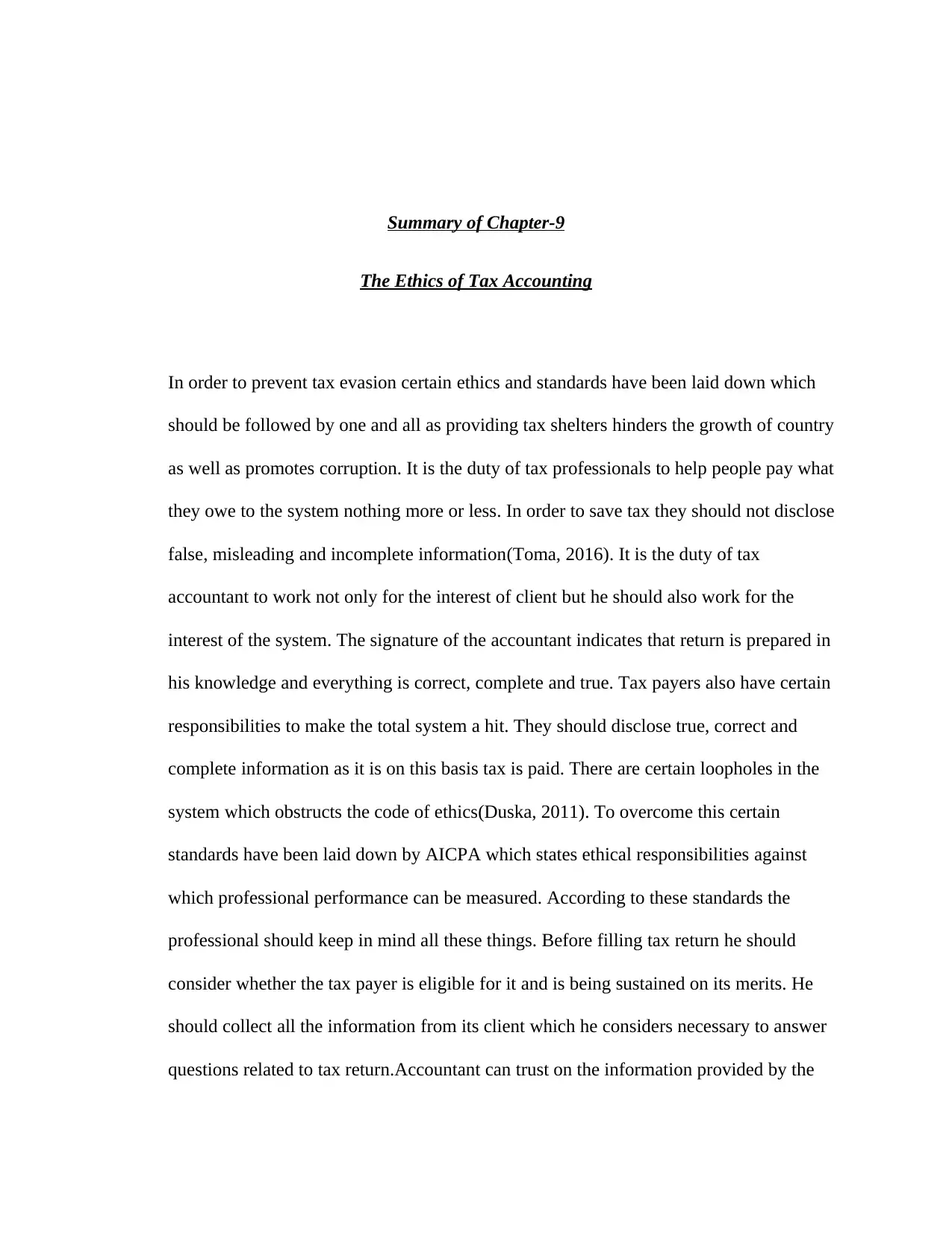
Summary of Chapter-9
The Ethics of Tax Accounting
In order to prevent tax evasion certain ethics and standards have been laid down which
should be followed by one and all as providing tax shelters hinders the growth of country
as well as promotes corruption. It is the duty of tax professionals to help people pay what
they owe to the system nothing more or less. In order to save tax they should not disclose
false, misleading and incomplete information(Toma, 2016). It is the duty of tax
accountant to work not only for the interest of client but he should also work for the
interest of the system. The signature of the accountant indicates that return is prepared in
his knowledge and everything is correct, complete and true. Tax payers also have certain
responsibilities to make the total system a hit. They should disclose true, correct and
complete information as it is on this basis tax is paid. There are certain loopholes in the
system which obstructs the code of ethics(Duska, 2011). To overcome this certain
standards have been laid down by AICPA which states ethical responsibilities against
which professional performance can be measured. According to these standards the
professional should keep in mind all these things. Before filling tax return he should
consider whether the tax payer is eligible for it and is being sustained on its merits. He
should collect all the information from its client which he considers necessary to answer
questions related to tax return.Accountant can trust on the information provided by the
The Ethics of Tax Accounting
In order to prevent tax evasion certain ethics and standards have been laid down which
should be followed by one and all as providing tax shelters hinders the growth of country
as well as promotes corruption. It is the duty of tax professionals to help people pay what
they owe to the system nothing more or less. In order to save tax they should not disclose
false, misleading and incomplete information(Toma, 2016). It is the duty of tax
accountant to work not only for the interest of client but he should also work for the
interest of the system. The signature of the accountant indicates that return is prepared in
his knowledge and everything is correct, complete and true. Tax payers also have certain
responsibilities to make the total system a hit. They should disclose true, correct and
complete information as it is on this basis tax is paid. There are certain loopholes in the
system which obstructs the code of ethics(Duska, 2011). To overcome this certain
standards have been laid down by AICPA which states ethical responsibilities against
which professional performance can be measured. According to these standards the
professional should keep in mind all these things. Before filling tax return he should
consider whether the tax payer is eligible for it and is being sustained on its merits. He
should collect all the information from its client which he considers necessary to answer
questions related to tax return.Accountant can trust on the information provided by the
Paraphrase This Document
Need a fresh take? Get an instant paraphrase of this document with our AI Paraphraser
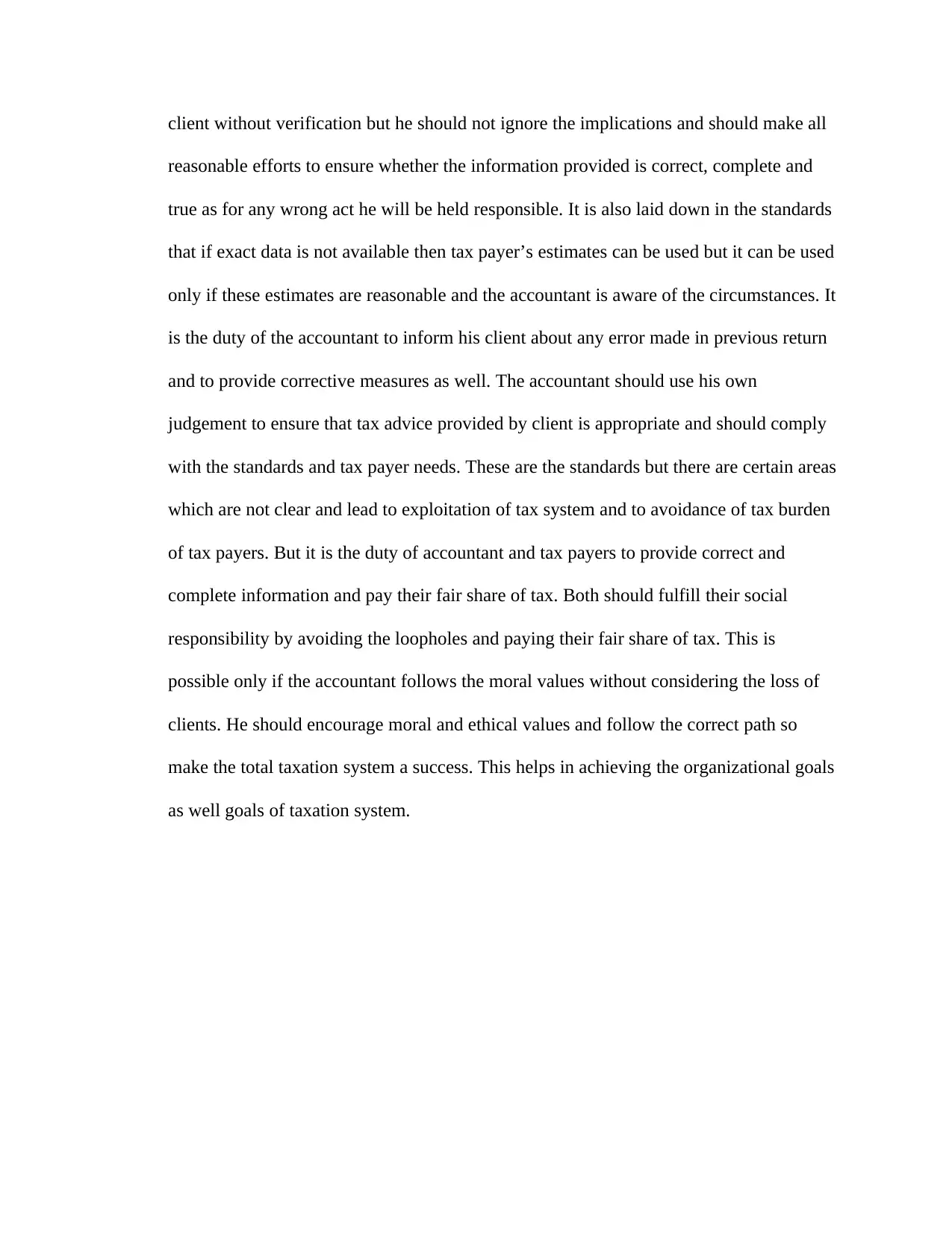
client without verification but he should not ignore the implications and should make all
reasonable efforts to ensure whether the information provided is correct, complete and
true as for any wrong act he will be held responsible. It is also laid down in the standards
that if exact data is not available then tax payer’s estimates can be used but it can be used
only if these estimates are reasonable and the accountant is aware of the circumstances. It
is the duty of the accountant to inform his client about any error made in previous return
and to provide corrective measures as well. The accountant should use his own
judgement to ensure that tax advice provided by client is appropriate and should comply
with the standards and tax payer needs. These are the standards but there are certain areas
which are not clear and lead to exploitation of tax system and to avoidance of tax burden
of tax payers. But it is the duty of accountant and tax payers to provide correct and
complete information and pay their fair share of tax. Both should fulfill their social
responsibility by avoiding the loopholes and paying their fair share of tax. This is
possible only if the accountant follows the moral values without considering the loss of
clients. He should encourage moral and ethical values and follow the correct path so
make the total taxation system a success. This helps in achieving the organizational goals
as well goals of taxation system.
reasonable efforts to ensure whether the information provided is correct, complete and
true as for any wrong act he will be held responsible. It is also laid down in the standards
that if exact data is not available then tax payer’s estimates can be used but it can be used
only if these estimates are reasonable and the accountant is aware of the circumstances. It
is the duty of the accountant to inform his client about any error made in previous return
and to provide corrective measures as well. The accountant should use his own
judgement to ensure that tax advice provided by client is appropriate and should comply
with the standards and tax payer needs. These are the standards but there are certain areas
which are not clear and lead to exploitation of tax system and to avoidance of tax burden
of tax payers. But it is the duty of accountant and tax payers to provide correct and
complete information and pay their fair share of tax. Both should fulfill their social
responsibility by avoiding the loopholes and paying their fair share of tax. This is
possible only if the accountant follows the moral values without considering the loss of
clients. He should encourage moral and ethical values and follow the correct path so
make the total taxation system a success. This helps in achieving the organizational goals
as well goals of taxation system.
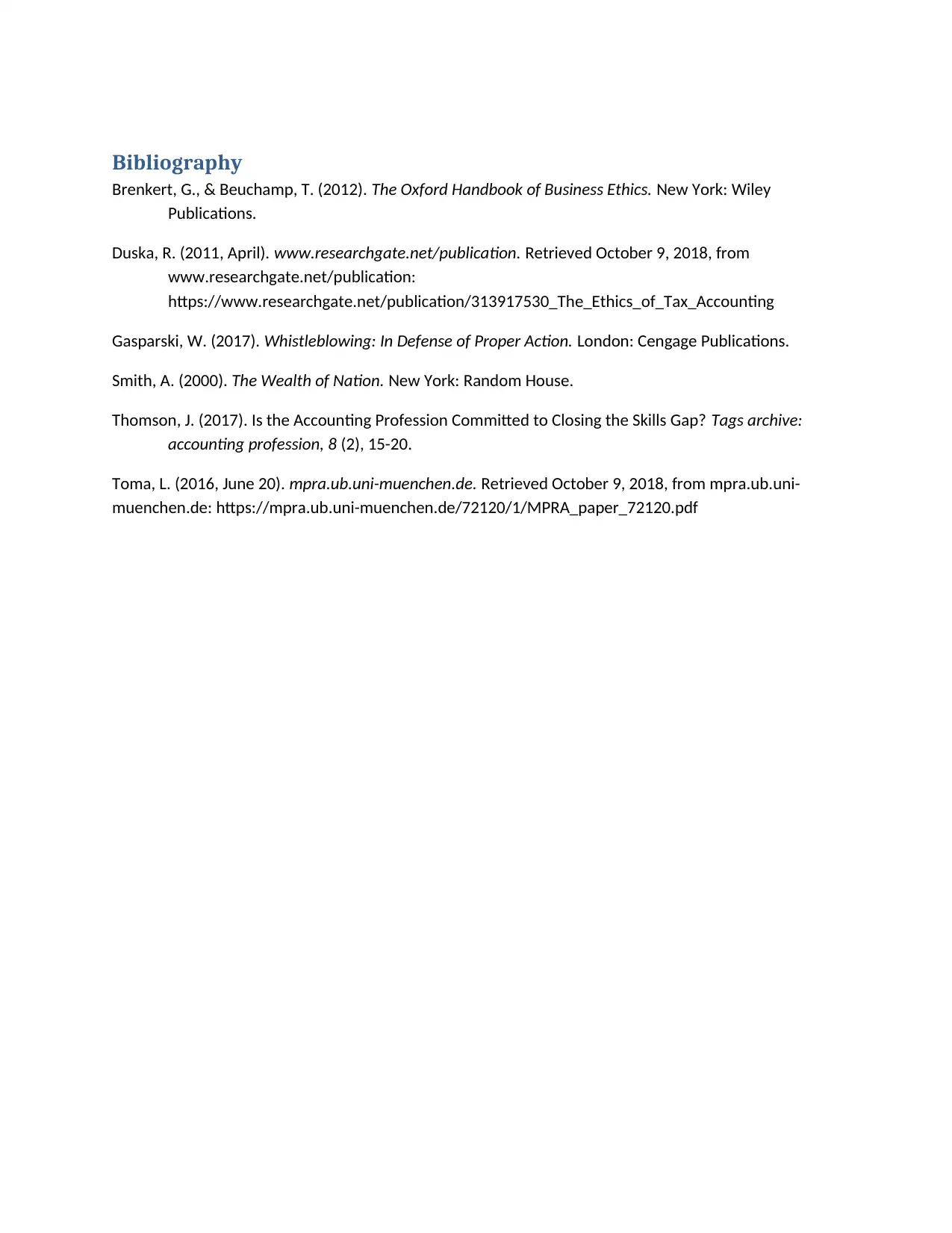
Bibliography
Brenkert, G., & Beuchamp, T. (2012). The Oxford Handbook of Business Ethics. New York: Wiley
Publications.
Duska, R. (2011, April). www.researchgate.net/publication. Retrieved October 9, 2018, from
www.researchgate.net/publication:
https://www.researchgate.net/publication/313917530_The_Ethics_of_Tax_Accounting
Gasparski, W. (2017). Whistleblowing: In Defense of Proper Action. London: Cengage Publications.
Smith, A. (2000). The Wealth of Nation. New York: Random House.
Thomson, J. (2017). Is the Accounting Profession Committed to Closing the Skills Gap? Tags archive:
accounting profession, 8 (2), 15-20.
Toma, L. (2016, June 20). mpra.ub.uni-muenchen.de. Retrieved October 9, 2018, from mpra.ub.uni-
muenchen.de: https://mpra.ub.uni-muenchen.de/72120/1/MPRA_paper_72120.pdf
Brenkert, G., & Beuchamp, T. (2012). The Oxford Handbook of Business Ethics. New York: Wiley
Publications.
Duska, R. (2011, April). www.researchgate.net/publication. Retrieved October 9, 2018, from
www.researchgate.net/publication:
https://www.researchgate.net/publication/313917530_The_Ethics_of_Tax_Accounting
Gasparski, W. (2017). Whistleblowing: In Defense of Proper Action. London: Cengage Publications.
Smith, A. (2000). The Wealth of Nation. New York: Random House.
Thomson, J. (2017). Is the Accounting Profession Committed to Closing the Skills Gap? Tags archive:
accounting profession, 8 (2), 15-20.
Toma, L. (2016, June 20). mpra.ub.uni-muenchen.de. Retrieved October 9, 2018, from mpra.ub.uni-
muenchen.de: https://mpra.ub.uni-muenchen.de/72120/1/MPRA_paper_72120.pdf
⊘ This is a preview!⊘
Do you want full access?
Subscribe today to unlock all pages.

Trusted by 1+ million students worldwide
1 out of 9
Related Documents
Your All-in-One AI-Powered Toolkit for Academic Success.
+13062052269
info@desklib.com
Available 24*7 on WhatsApp / Email
![[object Object]](/_next/static/media/star-bottom.7253800d.svg)
Unlock your academic potential
Copyright © 2020–2026 A2Z Services. All Rights Reserved. Developed and managed by ZUCOL.



